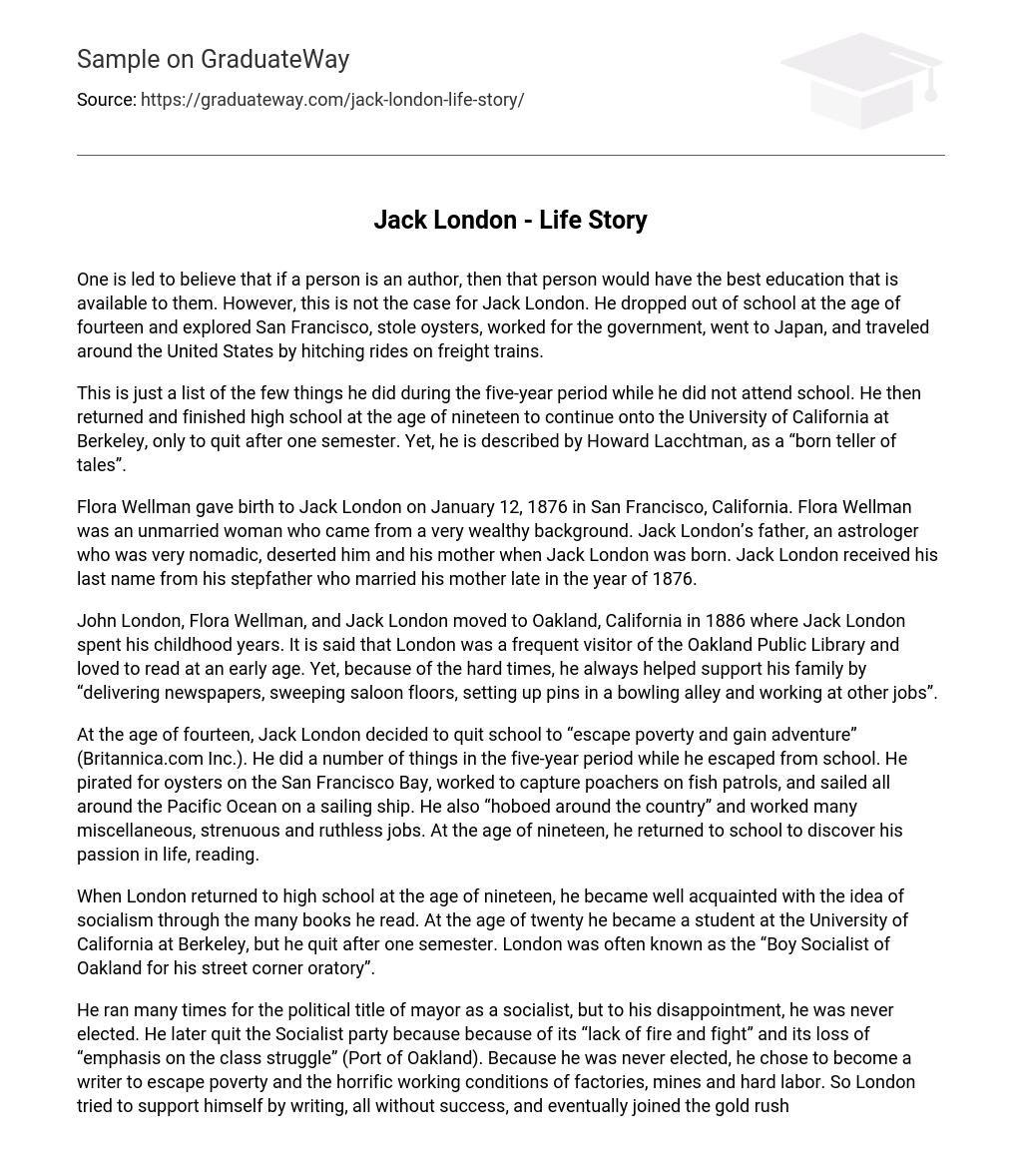Contrary to popular belief, being an author does not always require the best education. Jack London is a prime example of this as he left school at just fourteen years old and embarked on a range of diverse experiences. He explored San Francisco, participated in oyster theft, worked for the government, visited Japan, and journeyed across the United States by hitchhiking on freight trains.
Instead of attending school, he participated in various activities for a period of five years. At the age of nineteen, he returned and successfully finished high school before joining the University of California at Berkeley. Nevertheless, his time there was short-lived as he withdrew after only one semester. Despite this setback, Howard Lacchtman characterizes him as an innate storyteller.
Flora Wellman, a wealthy unmarried woman, gave birth to Jack London on January 12, 1876 in San Francisco, California. However, Jack London’s father, an astrologer with a nomadic lifestyle, abandoned both him and his mother upon his birth. It was only later in 1876 when Flora married and Jack received his last name from his stepfather.
John London, Flora Wellman, and Jack London migrated to Oakland, California in 1886, where Jack London spent his formative years. There is a belief that London regularly frequented the Oakland Public Library and had a passion for reading from a young age. However, due to financial difficulties, he consistently assisted his family by engaging in various jobs such as delivering newspapers, cleaning saloon floors, setting up bowling pins, and undertaking other tasks.
According to Britannica.com Inc., Jack London made the decision to leave school at fourteen so as to “escape poverty and gain adventure.” Over the next five years, he engaged in various activities such as oyster pirating on the San Francisco Bay, participating in fish patrols to apprehend poachers, and embarking on a sailing ship voyage across the Pacific Ocean. He also traveled as a hobo nationwide and took on numerous demanding and challenging jobs. At nineteen, he chose to return to school where his passion for reading blossomed.
London first became interested in socialism at the age of nineteen, when he returned to high school and immersed himself in various books on the topic. He then enrolled as a student at the University of California at Berkeley but dropped out after one semester. London gained fame as the “Boy Socialist of Oakland” because of his passionate speeches on street corners.
Despite multiple unsuccessful attempts at being elected mayor as a socialist, he became greatly disappointed. This disappointment eventually led him to abandon the Socialist party due to its lack of enthusiasm and emphasis on the class struggle. Frustrated by his ongoing poverty and harsh working conditions in factories and mines, he chose to pursue a writing career instead. However, his initial writing endeavors did not bring him success. In 1897, he took part in the Klondike gold rush with hopes of finding fortune. Upon returning from this venture in 1898, he made another attempt at establishing himself as a writer.
He sold his story titled “To the Man on Trail” to the Overland Monthly of San Francisco for $5. After being published in the magazine, he transformed into a committed and well-regulated writer. Subsequently, in 1900, he finalized his debut book, The Son of the Wolf, which comprises a compilation of his stories from Klondike, Alaska.
In the year of his initial book publication, London wed Elizabeth Maddern and they established their residence in Oakland, California. Upon the arrival of his first daughter Joan in 1901, he ventured into the Oakland mayoral race as a Socialist contender, though he did not emerge victorious. His second daughter Bess was born in 1902. Shortly thereafter, London and his family relocated to Piedmont Hills, where he formed a strong friendship with George Sterling. Nevertheless, this was not London’s final relocation nor did he experience everlasting happiness.
In 1905, Jack London divorced his wife Elizabeth and promptly married Charmian Kittredge. The couple purchased a ranch in Sonoma Valley, near Glen Ellen, where London would reside for the remainder of his life. In 1910, he began building a mansion intended to last a millennium. Tragically, the mansion was destroyed by fire in 1913, just one day before they were scheduled to move in. Later that year, London underwent an appendectomy and received the grim news from his surgeon that his kidneys were deteriorating rapidly, indicating a limited lifespan.
London passed away on November 22, 1916 as a result of suffering from uremia, a serious kidney disease. Throughout his life, London authored more than 50 short stories, poems, and novels featuring boxing, icy explorations, and Klondike routes. He witnessed numerous historic events unfold during his lifetime.
References
- Britannica.com Inc. “London, Jack.” 14 Oct. 2000. Available WWW: http://www.britannica.com/bcom/eb/article/0/0,5716,49990+1,00.html
- London, Jack. The Call of the Wild. New York: I. Wadman & Son, INC., 1979.
- Lundberg, Murray. “The Life of Jack London as reflected in his Works.” n pag. On-line. 13 Sept. 2000. Available WWW: http://articculture.about.com/culture/arcticculture/library/yafeatures/bl-london.htm
- Lundberg, Murray. “The Life of Jack London as reflected in his Works.” n pag. On-line. 13 Sept. 2000. Available WWW: http://articculture.about.com/culture/arcticculture/library/yafeatures/bl-london2htm
- Lundberg, Murray. “The Life of Jack London as reflected in his Works.” n pag. On-line. 13 Sept. 2000. Available WWW: http://articculture.about.com/culture/arcticculture/library/yafeatures/bl-london3.htm
- McLeod, Jim. “Jack London Main Page.” n. pag. On-line. 13 Sept. 2000.Available WWW: http://www.jacklondon.com
- Stasz, Clarice. “Jack London’s ‘Credo’.” 19 Jan. 1999: n. pag. On-line. 13 Sept. 2000. Available WWW: http://www.sunsite.berkeley.edu/London/credo.html
- Stasz, Clarice Dr. “John Griffiths London.” 15 May 2000: n. pag. On-line. 13 Sept. 2000. Available WWW: http://www.sunsite.berkeley.edu/London/jackbio.html





